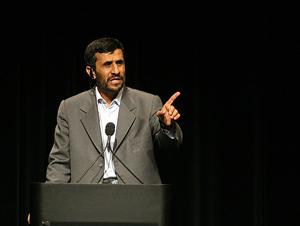Missiles and politics in Iran
President of Iran, Mahmoud Ahmadinejad, speaking at Columbia University in 2007 (Image: Daniella Zalcman)
The following is not a full transcript; for full story, listen to audio.
Iran claimed it had test-fired an advanced missile that could potentially reach Israel and U.S. bases in the Gulf. Secretary of State Hillary Clinton warned that a nuclear armed Iran would "spark an arms race in the Middle East." The missile test and the U.S. response comes in a week when politics takes center stage in Iran. The Iranian President, Mahmoud Ahmadinejad, faces re-election next month and campaigning for that election begins formally on Friday.
On "The Takeaway," Jon Leyne, the BBC’s correspondent in Tehran, breaks things down.
It’s a campaign story and a national security story. The launch of an advance missile at the start of a presidential campaign in Iran suggests that the campaign is going to be all about Iran’s defiance of the world’s concerns over its nuclear program.
Leyne says this may be what President Ahmadinejad wants the campaign to be about but, "The other candidates would like it to be about the economy, which they say is a real mess and they blame him.
"I went to a meeting of one of the candidates campaign this morning … and they were trying to link President Ahmadinejad’s foreign policy with the bad state of the economy, blaming him for Iran’s international financial isolation and financial sanctions, which they say were damaging the economy."
Recently, Secretary of State Hillary Clinton said: "Our goal is to persuade the Iranian regime that they will actually be less secure if they proceed with their nuclear weapons program."
Leyne: "I think that would be the pitch from some of the opposition candidates here as well, but on the other hand, President Ahmadinejad does a good line in defiance, and in trying to stir national pride and also tries to play that nationalist card."
How the candidates are chosen: "They allow pretty much anybody to register … and then a thing called the "Guardian Council" whittles down the list, and the constitution says that they must be personalities who are … political and religious personalities, which I think really means eminent personalities. It’s not quite clear in the constitution whether that allows women to stand, but they’ve all been disqualified, and so have all of the 425 odd candidates who have applied. Except to be fair, the main four … left on the ballot … are the four leading candidates."
Leyne says the missile launch, "… was an attempt by President Ahmadinejad to grab the limelight on the day that the candidates were announced and to show exactly where he’s coming from, which is defiance and national pride, as he would put it.
"It’s nothing particularly ground breaking in that we’ve already seen the launch of one of these missiles before, but in the bigger picture … it’s one of the longest range missiles, one of the most advanced missiles Iran has got, and on the other side … of the water, it’s interesting that Washington didn’t seem to want to take the bait. There was not much condemnation so there wasn’t the kind of big international fuss about it that perhaps, President Ahmadinejad was looking for when he personally made the announcement of the launch of the missile test."
"The Takeaway" is a national morning news program, delivering the news and analysis you need to catch up, start your day, and prepare for what’s ahead. The show is a co-production of WNYC and PRI, in editorial collaboration with the BBC, The New York Times Radio, and WGBH.
Every day, reporters and producers at The World are hard at work bringing you human-centered news from across the globe. But we can’t do it without you. We need your support to ensure we can continue this work for another year.
Make a gift today, and you’ll help us unlock a matching gift of $67,000!
